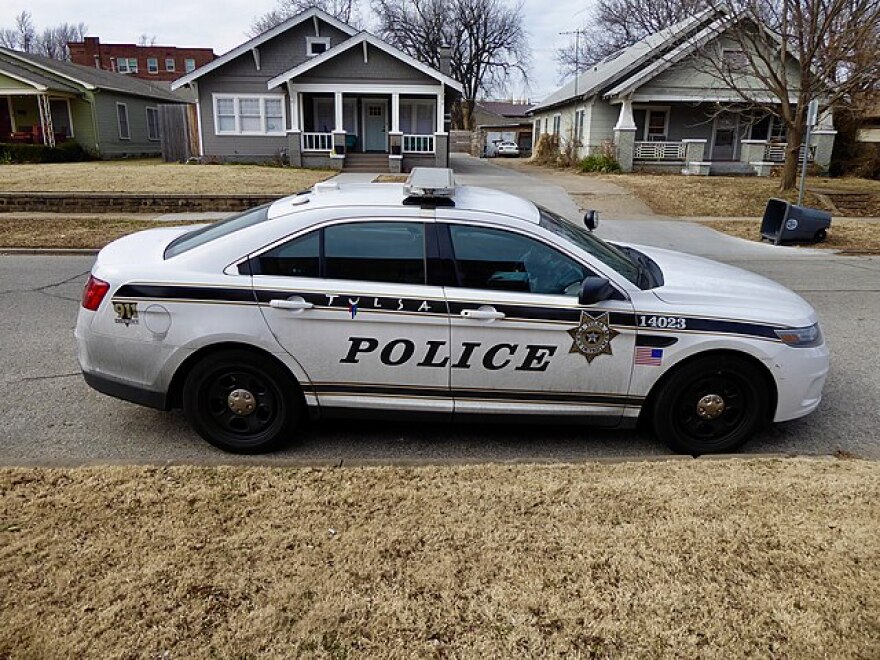Some of Oklahoma’s largest police departments will change their protocols for responding to incidents on interstates amid a push by the Oklahoma Highway Patrol to try to force them to assume more responsibilities.
Of the departments contacted by Oklahoma Voice, Oklahoma City, Edmond and Norman said their protocols will not change, meaning the Oklahoma Highway Patrol will need to respond to incidents along interstates in their jurisdiction.
Only the Tulsa and Moore police departments said they have made changes to how they patrol interstates within their jurisdiction.
A Tulsa police spokesperson said officers will respond to and investigate reports of non-injury collisions, crime, disabled vehicles, road debris and drunken drivers on the 42 miles of interstate in their jurisdiction.
“If officers arrive and it is an injury collision, they will render aid until Troopers from the Oklahoma Highway Patrol arrive,” said a spokesperson for the Tulsa Police Department in a statement. “We will respond to everything but fatality collisions, injury collisions, and collisions involving large (commercial motor vehicles).”
Moore Police Chief Todd Gibson said in a statement that officers have “proactively” been assisting Highway Patrol with motor vehicle accidents and traffic response with a “comprehensive plan” along the 5.5 miles of Interstate 35 that cuts through city limits.
This plan includes deploying Moore police when the Highway Patrol’s estimated arrival time exceeds 15 minutes, conducting ongoing training focused on highway safety for officers and continuing to provide fire and medical response to accidents, according to a statement.
Oklahoma City Police will render medical aid and handle motorist assists and DUIs if an officer comes across those incidents on the interstates, but will refer all crashes to the Highway Patrol which does not differ from current protocol. Over 100 miles of interstates cross through the city limits.
Del City and Midwest City police did not respond to a request for comment by deadline.
In July, the Oklahoma Highway Patrol announced plans to move its resources out of the state’s urban areas by Nov. 1 and shift responsibility for the interstates and highways within those jurisdictions to local law enforcement. The agency said it would refocus those on areas with the “greatest need” outside of Oklahoma City, Tulsa, Edmond, Moore, Norman, Midwest City and Del City. The agency said it would prioritize areas covered by smaller law enforcement footprints.
The plan drew immediate pushback from leaders within those urban areas, and Attorney General Gentner Drummond later found the plan to be illegal. Drummond said the Highway Patrol cannot make “the arbitrary decision to foist its responsibility” onto the municipal and county law enforcement in certain counties, and that state law vests it with the primary authority to patrol interstates.
Over 1.4 million people, or over a third of the state’s population, reside in those seven cities, according to the U.S. Census Bureau.
Public Safety Commissioner Tim Tipton said the plan was never to “abandon” the metros, but to stretch the Highway Patrol’s coverage in the state.
He said the Highway Patrol has asked the metros to assist with calls within city limits and has had “great support.”
“It’s important that we have troopers out 24/7 on the interstate system, hopefully to deter bad driving, speed, dangerous driving behavior, and to be able to respond, especially in those areas where there’s no other law enforcement anywhere around,” he said. “Both here in the Oklahoma City metro area and in the Tulsa metro area, we’ve got great partnerships with those local (police departments) that when they’re available, they help us with those more minor collisions, and they’ve been doing that.”
He said sharing the responsibility for responding to calls on the interstates allows his agency to “stretch” their coverage.



